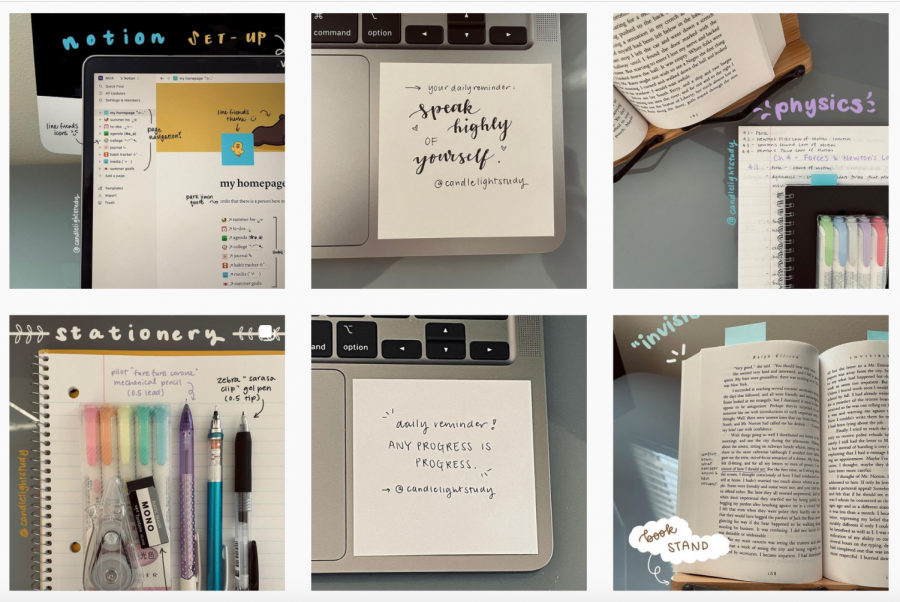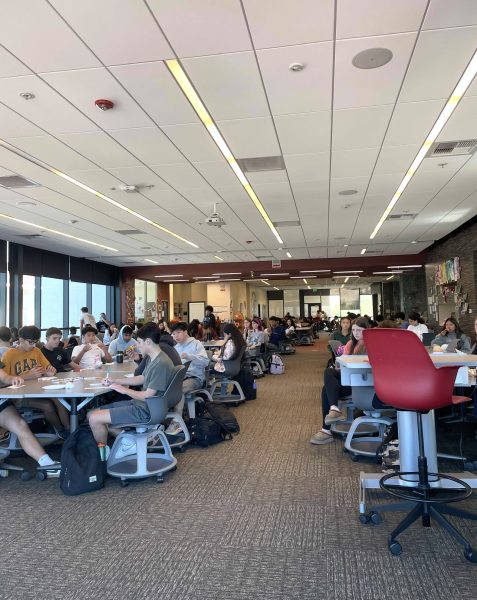Studytube: A high schooler’s best friend?
Photo courtesy of Macie Calvert
On senior Michelle Chen’s Studygram, images of her AP Lit notes and Physics homework can be found. Chen decided to start the account, @candlelightstudy, as a means of study motivation.
Hate homework? Can’t stop being distracted during AP World notes? Are you one of those people that tries to watch Netflix on split-screen while writing essays? Don’t fret—there’s a cure, and it’s two words: romanticize it.
At least, that’s what Studytok will tell you. Or Studytube, or Studygram. After pausing their NYC coffee shop ambiance and looking up from their mint-green MOFii keyboard.
For those unfamiliar, the suffixes of these words refer to their platform, including TikTok, YouTube, Tumblr, or Instagram. These online study communities share a common goal of encouraging academic success via note-taking tips, organization hacks, or unique online finds that one can utilize to increase productivity.
These videos are usually filled with aesthetically pleasing shots of organized, minimalist desktops, pages of color-coordinated notes, all in the rosy glow of a Himalayan salt desk lamp. (Also, iced matcha lattes. They’re always drinking iced matcha lattes.)
“[My favorite aspects of the community] are the aesthetics of it all,” said senior Michelle Chen, who runs her own Studygram, @candlelightstudy. “The colorful stationery, the notebooks with dotted paper, the beautiful calligraphy.”
On YouTube, for example, one can use a “3 hour Study With Me” video as motivation. Many of these videos (often live-streamed) simply showcase the YouTuber taking notes for the duration of time, with little dialogue or sound, save for some Lo-Fi beats or coffee shop ambiance. Several videos use the Pomodoro method, a prevalent means of focusing in the Studytube community, which involves working in 25-minute stretches with five-minute breaks in between them.
“It just brings a really nice aesthetic to studying where it’s more like a beautiful and creative activity rather than just lame work,” senior Sabeeka Qureshi said. “It shows me how to “game” my studying to make it as personalized and as fun as possible.”
Chen started her Studygram because it served as motivation for her to do her summer homework.
“I wanted a creative outlet that I could work on… it’s definitely made me feel some pressure to only post the “prettiest” parts of my notes, and have felt that other creators’ setups are much more aesthetic than mine,” Chen said.
The need to create aesthetically pleasing content can sometimes eclipse actual studying on these online communities. Furthermore, by emphasizing looks over quality, the buying of products can be prioritized over actual studying. According to Chen, prominent members of the StudyTube have spoken out about some issues with the community, especially revolving around waste of pretty stationery or other supplies.
“In the long run, it just wasn’t sustainable for me to make all of my notes [aesthetically pleasing],” Chen said. “Eventually I just decided to sacrifice the aesthetics in favor of the actual purpose of notes—to take down information for later reference.”
Though these communities may motivate, they are still social media outlets, and with social media comes an aspect of artificiality. Seeing people online who can study for hours on end and create seemingly perfect notes can put pressure on students.
“I can see how romanticizing overworking can be a problem, but I think that’s more of an issue that applies to [specific accounts in the online community],” Qureshi said.
According to Qureshi, who frequently utilizes Studytube, several YouTubers in the community include reminders for their watchers not to overwork themselves, to take breaks, and drink some water.
“[Romanticizing studying] isn’t necessarily a negative,” Chen said. “It’s kind of like finding solidarity when a task seems insurmountable. Even though your favorite creators might not be studying the same subject as you, you realize that they’re putting in the effort to do well just as you know you can.”
Communities like Studytok and Studytube exhibit how much studying and academic achievement have become venerated by this generation’s teens. People can gain fame on social media platforms via studying instead of playing video games or dancing, whilst motivating others to work harder—perhaps too hard. But whether this positively or negatively affects high school students, it’s intriguing all the same that studying, a task nearly universally loathed by every student, seems to be getting the limelight for once.

Macie Calvert is a senior in her third year of Journalism and the editor-in-chief of The Stampede this...








